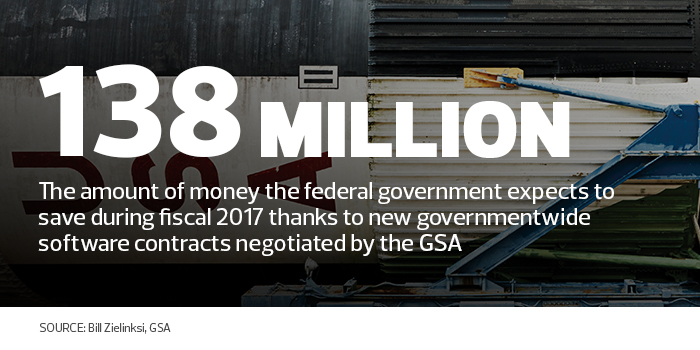sponsor content What's this?
How NASA Saved $100 Million on Software Licenses

Using a specialized Software Asset Management tool and other strategies, the space agency uncovered software consolidation opportunities.
NASA faced another moon shot.
This time, the civilian space agency’s monumental task was to help reduce government spending on software. For NASA, that meant eliminating duplicate software licenses and negotiating better prices for the software it already buys.
In 2008, NASA created the Enterprise License Management Team (ELMT) to inventory its software assets and to centrally manage software purchases.
Since then, NASA has leveraged its buying power to take advantage of volume pricing. It also has identified unused software licenses in some locations and is reusing those licenses elsewhere in the organization, says Darryl A. Smith, NASA’s agency software manager. Those efforts have led to $103 million in cost avoidance since 2011.
“By getting better insight into what we’re spending, who is buying it and where the assets are located, we can then look to see if there are better ways to procure software and whether there are existing assets in the environment that we can reutilize,” Smith says.
In 2014, the last time the Government Accountability Office studied the issue, investigators found the vast majority of federal agencies did not have adequate policies for managing software licenses. But because the government spends roughly $6 billion each year on commercial software, agencies see a strong incentive to improve software license management and to cut costs.
With that in mind, the Office of Management and Budget began requiring each agency to appoint a software manager to oversee software licenses and to maintain an accurate inventory of those licenses by using automated software asset management tools.
OMB also asked agencies to analyze that inventory, so they can consolidate redundant applications and find other cost-saving opportunities. The guidance calls for a team of senior federal IT and acquisition leaders — called the Enterprise Software Category Team — to negotiate governmentwide software license agreements with vendors.

Amy Konary, vice president of software business models at IDC, says using technology and new processes to better manage software licenses should lead to savings across government.
“Centralization can help with volume discounts, but it can also help organizations avoid buying duplicate licenses,” she says. “It gives you an accurate picture of what everyone needs.”
Saving Money Through Governmentwide Contracts
The General Services Administration takes a two-pronged approach to help agencies better manage their software environments and eliminate software sprawl. Through its Software License Management as a Service offering, individual agencies receive guidance and training on developing a proper governance structure for software management. GSA also offers advice on implementing software asset management (SAM) tools.
“In many instances, agencies already have tools and capabilities. We do a deep dive and help them understand what they have and how to make best use of it,” says Bill Zielinski, GSA’s IT category manager. “If there are gaps, we help them do a better job of managing their software and connect them to other products for better software management.”
SAM tools can automatically discover the software running in an IT environment, not only helping agencies inventory software, but also ensuring each application has the latest updates, Zielinski says.
The Enterprise Software Category Team — co-managed by GSA, OMB and the Defense Department — includes software managers from 30 agencies who meet weekly to discuss challenges and share best practices.
The members also discuss their software needs and decide how to collaborate on governmentwide contracts, not just agency-specific deals. The GSA has completed three contracts with such an approach, Zielinski says.
A new deal to purchase Adobe software could save as much as $350 million. In another, a brand of mapping software is discounted by up to 14 percent, he says.
A New Negotiation Strategy for Software
At NASA, the number of agencywide software contracts rocketed from 14 in 2011 to 60 in 2016. This way NASA benefits from lower pricing, while vendors save by not sending sales teams to centers nationwide. “Every procurement we execute allows personnel at those sites to focus on mission-oriented activities,” Smith says.
The more competitive pricing led to $26 million in cost avoidance in fiscal 2015, and $35 million last year, Smith says.

At the same time, NASA plans to improve its software inventory tracking by replacing its current asset management program with a different commercial automated tool that will offer a more comprehensive, enterprise view of its software. Smith says that should help the agency overcome one of its greatest challenges when negotiating agencywide contracts: determining how many software licenses are being used.
To come up with that figure today, ELMT analyzes NASA’s purchasing and financial systems and existing SAM tool to get an idea of an application’s existing footprint. Then the agency reaches out to the vendor to find out how many licenses NASA’s centers purchased. The two compare notes and negotiate, he says.
The ELMT doesn’t always accept the lowest possible price if that locks in the agency with a long-term contract. “You run the risk of paying for software you no longer need,” he says.
Instead, they negotiate for best value and lower prices than if centers had bought the software individually, he says.
Centralizing Software Purchases and Using SAM
Elsewhere in government, U.S. Citizenship and Immigration Services (USCIS) now centralizes purchases and takes inventory of its existing software.
About three years ago, the agency formed a strategic vendor management (SVM) branch that oversees software purchases and license renewals. Software requests go through an employee self-service page, which ensures the software is necessary, approved and that licenses are available.
The SVM team makes small software purchases on users’ behalf, while individual program offices go through the traditional acquisition process for larger purchases. During those steps, the SVM team ensures the licenses are necessary and do not duplicate existing programs.
Already, USCIS’ asset management software collects data from 90 percent of its workstations and servers and is working with vendors to gather the rest, says Daniel Cosgrove, an agency spokesman.
Meanwhile, USCIS maintains a database of all licenses and tracks whether they are used. When users leave the agency or no longer need the software, the organization manually updates the information — a system prone to error, he says. By integrating its asset management tool with existing tools, USCIS hopes to automatically generate a real-time count of active licenses.
“With the ability to monitor actual license use, USCIS will be able to reduce spending on unnecessary licenses,” Cosgrove says.
This content is made possible by FedTech. The editorial staff of Nextgov was not involved in its preparation.





